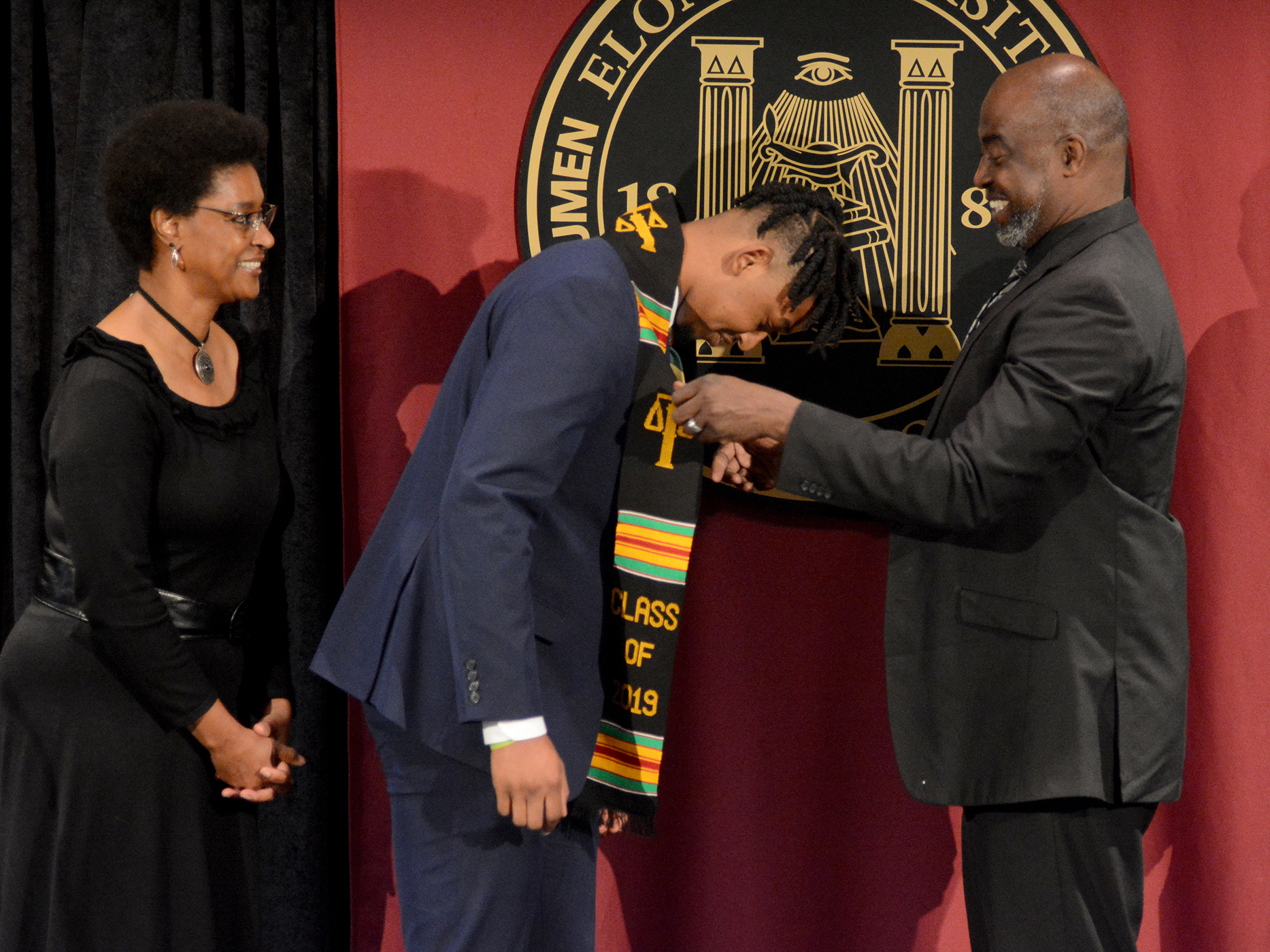With words of encouragement from Elon Law’s dean emeritus, African-American graduates in the Class of 2019 and their families celebrated on Friday the achievements and promise of a legal education in the law school’s third annual Donning of the Kente Ceremony.
Elon Law Dean Emeritus George R. Johnson Jr. delivered a simple message for African-American graduates on the eve of their graduation from law school: As you invoke the spirit of your ancestors, be justifiably proud of your achievement.
Yet remember that accomplishments as law students aren’t yours alone, he said. Parents sacrificed their own dreams, spouses and partners took on extra shares of domestic responsibilities, and children lost time with their parents and older siblings. So thank them.

“This is undoubtedly your day and you should bask in it,” Johnson said in keynote remarks for Elon Law’s 2019 Donning of the Kente Ceremony. “Not only have you succeeded in your academic pursuits, but you and other students of color have made important contributions to the life and environment of this community. Your work here can and will continue to inspire students of color and other students as well who will follow you.”
The law school’s third annual kente ceremony on Dec. 13, 2019, celebrated the achievements of 11 African-American graduates active in the Black Law Students Association. Dozens of family, friends, and law school faculty and staff gathered in the Elon Law Library to commemorate the moment.
More than anything, Johnson said in his remarks, the ways in which graduates questioned the status quo and pressed their professors to consider new ideas and new approaches to teaching also will serve as a legacy.
“Even as you have made major contributions to the quality of life and experience at Elon, you have been disruptors as well, and I applaud you for that, too,” he said. “You and your colleagues have disrupted the ways in which we do things here, by asking us pointed questions, and by challenging us to examine assumptions and predispositions we have long ceased to doubt.”

Because of their disruptions, Johnson said, professors and staff are more likely to ask why, or why can’t we do it differently, or is something fair, or is it just? Answers may not always be satisfactory, he said, but students should be thanked for at least prompting reflective questions.
And the ability to disrupt will serve graduates well as they use their legal educations to advocate for the communities in which they live in work. “You will not always be welcomed, but you will always be needed,” Johnson said. “And you have proven yourselves worthy to the tasks.”
The kente program featured a welcome by Elon Law Dean Luke Bierman with additional remarks by Margaret Dudley, director of Elon Law’s Emergency Legal Services Program at the Guilford County Family Justice Center, and Assistant Professor Tiffany Atkins L’11.
Bierman emphasized how few African-American lawyers practice in the United States – about 65,000 – compared to the approximate 1.3 million number of attorneys total in the American legal profession and 330 million Americans.

“It’s a number that we as a profession must continue to grow,” Bierman said. “We are proud at our law school for our commitment to increasing that number and the things we have done to contribute to that goal. We know that you will make a significant contribution in our profession that will add to the diversity and inclusiveness of our work as lawyers.
“Congratulations, graduates. Let the symbolism of the vibrant kente stole sustain you in your work as you prepare for the bar exam and undertake to help others as a lawyer prepared for practice at Elon Law.”
As part of the ceremony, graduates received a stole made of kente cloth imported from West Africa. Each graduate selected a mentor, professor or family member to present their kente cloth, acknowledging the work and perseverance of completing law school while and encouraging their future endeavors.

The kente cloth symbolizes and celebrates prestige in many African societies. Its origins date to 12th Century Ghana where the cloth was worn by kings, queens and important figures of state in Ghanaian society, during ceremonial events and special occasions. In a cultural context, it is a visual representation of African history, philosophy, ethics, oral literature, moral values, social code of conduct, religious beliefs, political thought and aesthetic principles.
Graduates wear the stole, embroidered with the BLSA acronym and their class year, at Commencement.
Atkins serves as co-advisor to the Black Law Students Association and closed the program by reminding graduates that the achievements were made possible by those who came before them.

She also called Johnson back to the stage to thank him for his many contributions to the success of Elon Law and to helping its students of color thrive as future legal leaders. Miriam Heard L’09 joined Atkins in presenting Johnson with a kente stole of his own.
“This is by far one of my most favorite things that Elon Law does for its students,” Atkins said. “It’s a very special time when we honor not only the traditions of our ancestors, those rich cultural practices we have gotten from the continent of Africa, but also honor those people who come before us, whose footsteps we stand in, who shoulders we stand on, acknowledging that all of our successes come from the path they paved for us.”



